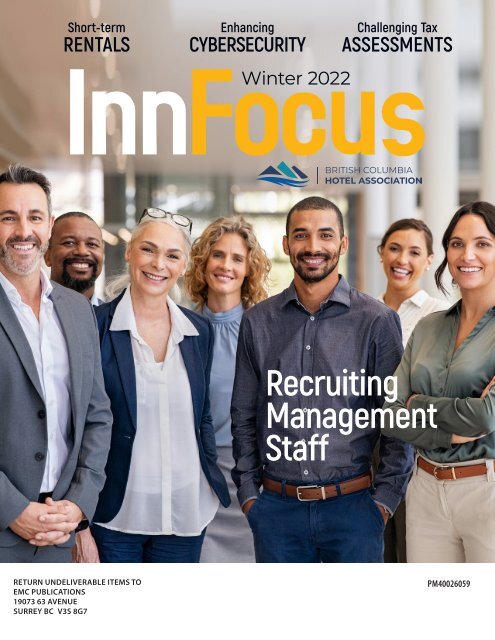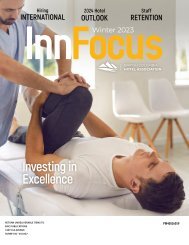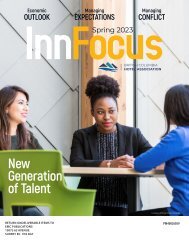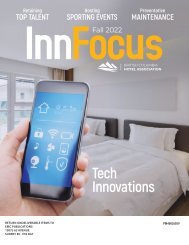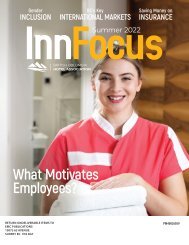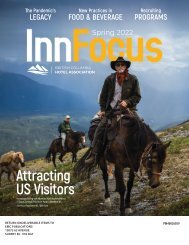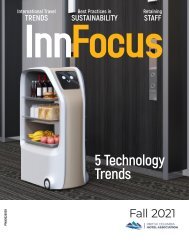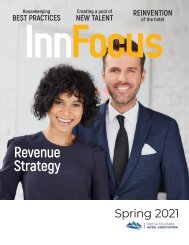InnFocus Winter 2022
InnFocus magazine for hoteliers in British Columbia
InnFocus magazine for hoteliers in British Columbia
You also want an ePaper? Increase the reach of your titles
YUMPU automatically turns print PDFs into web optimized ePapers that Google loves.
Short-term<br />
RENTALS<br />
Enhancing<br />
CYBERSECURITY<br />
<strong>Winter</strong> <strong>2022</strong><br />
Challenging Tax<br />
ASSESSMENTS<br />
Recruiting<br />
Management<br />
Staff<br />
RETURN UNDELIVERABLE ITEMS TO<br />
EMC PUBLICATIONS<br />
19073 63 AVENUE<br />
SURREY BC V3S 8G7<br />
PM40026059
Partner with an Industry Leader<br />
Focused on Franchisee Success.<br />
With the cyclical nature of our industry, we constantly evolve to anticipate the needs of our hotel<br />
owners, help grow their businesses and ultimately, help maximize the return on their investments.<br />
Our proven brands in the upscale, upper midscale, midscale, extended stay and economy market<br />
segments, coupled with our industry expertise, Canadian support teams, resources and tools, give<br />
every hotelier the opportunity to achieve their dreams.<br />
We are here to help you succeed.<br />
ChoiceHotelsDevelopment.ca<br />
©<strong>2022</strong> Choice Hotels Canada Inc. All Rights Reserved.
contents<br />
200-948 Howe Street,<br />
Vancouver, BC V6Z 1N9<br />
T 604-681-7164 1-800-663-3153<br />
www.bcha.com<br />
@BCHotelAssociation<br />
@bchotelassoc<br />
@BCHotelAssociation<br />
bchotelassociation<br />
BCHA Team<br />
Ingrid Jarrett<br />
President & CEO<br />
Mike Macleod<br />
Director Member<br />
and Business Development<br />
Karissa Bourgeault<br />
Project Manager & Board Liaison<br />
Kelsey Millman<br />
Communications Manager<br />
Samantha Glennie<br />
Member Services Manager<br />
Dylan Tomlin<br />
Energy Specialist<br />
Vanda Fragoso<br />
Member Services Coordinator<br />
<strong>2022</strong>/2023 Board of Directors<br />
Executive Committee<br />
David McQuinn – Coast Bastion Hotel, Nanaimo (Chair)<br />
Tanya Stroinig – Prestige Hotels & Resorts, Kelowna<br />
(Vice Chair)<br />
Bryan Pilbeam – Delta by Marriott Hotels, Kamloops<br />
(Past Chair & Governance)<br />
David MacKenzie – Pemberton Valley Lodge, Pemberton<br />
(Treasurer)<br />
Angie Eccleston – Crest Hotel, Prince Rupert<br />
(Executive Director)<br />
Jonas Melin – Pinnacle Harbourfront Hotel, Vancouver<br />
(Executive Director)<br />
6<br />
12<br />
18<br />
26<br />
Regulars<br />
Recruiting Management Staff<br />
What are strategies for finding the right candidate?<br />
Enhancing Cybersecurity<br />
Protect your property from ever-evolving cyber threats.<br />
Challenging Property Tax Assessments<br />
How can appeal an assessment?<br />
Differentiating your Property from STRs<br />
Highlight what sets you apart from STRs.<br />
4 BC Hotel Association Report<br />
5 Leader of the Future: Isabella Beltran<br />
9 Names in the News<br />
9 What’s New?<br />
10 Go Green – EV Chargers<br />
15 Hotelier Feature: Daniel Bibby<br />
21 Trends - Business Travel<br />
29 BC Hospitality Foundation Update<br />
30 BCHA Member Engagement<br />
Regional<br />
Feature<br />
16 Richmond<br />
extras<br />
24 11 Reasons to Shop Local<br />
Directors<br />
Christine Louden – Granville Island Hotel, Vancouver<br />
Eda Koot, Inn at Laurel Point, Victoria<br />
Eleanor Ryan – Pomeroy Hotel & Conference Center,<br />
Fort St. John<br />
Erin Cassels, Huntingdon Manor, Victoria<br />
Estreya Gosalbez, Four Seasons Resort, Whistler<br />
Jean-Francois Vary, Fairmont Waterfront Hotel, Vancouver<br />
Jessica Dolan – Ramada Penticton, Penticton<br />
Leo Saad – Best Western Plus Chateau, Fort St. John<br />
Madone Pelan, Oak Bay Beach Hotel, Victoria<br />
Samantha Hackett – Long Beach Lodge, Tofino<br />
PUBLICATIONS MAIL AGREEMENT<br />
NO. 40026059<br />
RETURN UNDELIVERABLE CANADIAN<br />
ADDRESSES TO CIRCULATION DEPT<br />
EMC PUBLICATIONS<br />
19073 63 AVENUE<br />
SURREY BC V3S 8G7<br />
email: info@emcmarketing.com<br />
<strong>InnFocus</strong> is published quarterly<br />
by EMC Publications - a division<br />
of EMC Executive Marketing Consultants Inc.<br />
19073 63 Avenue, Surrey, BC, V3S 8G7<br />
t 604-574-4577 1-800-667-0955<br />
info@emcmarketing.com<br />
www.emcmarketing.com<br />
Publisher & Editor: Joyce Hayne<br />
Design & Layout: Kyla Getty<br />
Sales Manager: Beatriz Friz<br />
<strong>InnFocus</strong> 3
y Ingrid Jarrett, President & CEO<br />
Over recent months, we have witnessed<br />
significant industry recovery in most regions<br />
of British Columbia and Canada. While it<br />
is wonderful to see current occupancy is<br />
outperforming 2019 levels, clearly, a few<br />
months of strong business don’t make up for<br />
more than two years of losses. This fact is<br />
especially true given the ongoing shortfall in<br />
available workers, which has been identified<br />
as our industry’s single greatest barrier to<br />
recovery.<br />
Workforce Shortage<br />
We continue to focus on ways we can alleviate<br />
this pervasive workforce crunch by growing<br />
our domestic workforce, retaining talent of<br />
current employees, and tapping into the<br />
international labour market. Our team has<br />
developed partnerships with supporting<br />
companies who can recruit, train, and place<br />
workers around the province.<br />
In November, we attended the Destination<br />
Canada Mobility Forum (DCMF), which took<br />
place in France and Morocco. The DCMF<br />
is organized by IRCC and provides an<br />
opportunity for workers in both regions and<br />
other French speaking countries to meet<br />
Canadian representatives looking to bring<br />
workers to Canada. Beyond working directly<br />
with job seekers to secure placements at<br />
participating hotels, this event allowed us to<br />
further solidify new partnerships, which have<br />
been critical in our workforce problem-solving.<br />
We are excited to see how the success of this<br />
event positively impacts our sector in both the<br />
short- and long-term.<br />
Back at home, our work with upskilling<br />
BC residents has seen remarkable results.<br />
Through our partnership with Progressive<br />
Intercultural Community Services (PICS), we<br />
have led three intakes for our Hotel Operations<br />
Services Skilling Training Project, which<br />
aims to give unemployed or underemployed<br />
individuals the education and background<br />
needed to successfully enter the workforce.<br />
We will continue to lead this work in 2023.<br />
In addition, we continue to engage and<br />
pressure government to create easier access<br />
to workers within our sector. Provincially,<br />
we are intent to expand eligibility for the<br />
Provincial Nominee Program. Federally, our<br />
aim is to remove the barriers of the Temporary<br />
Foreign Worker program, as we advocate for<br />
a hospitality-specific immigration stream, a<br />
AN INSURANCE PROGRAM TAILORED<br />
TO THE HOSPITALITY INDUSTRY<br />
From claims service to risk management, our fullservice<br />
hospitality insurance program has you covered.<br />
Join over 1,200 properties who are a part of Canada's<br />
longest running Hospitality Insurance Program.<br />
reduction or elimination of associated fees,<br />
and fast-tracked approval for the pending<br />
applications.<br />
Affordable Housing<br />
We know that for many of you, affordable<br />
housing is one of your most pressing<br />
concerns, which remains intimately tied to<br />
the workforce crisis and our short-term rental<br />
file. Communities across BC have witnessed<br />
a large amount of their rental housing be<br />
repurposed to short-term accommodations on<br />
platforms like Airbnb and VRBO. While these<br />
digital platforms do not pay the same in taxes<br />
as a traditional accommodator, the impact<br />
they are having on our workforce crisis is far<br />
more insidious as no workers are able to find<br />
affordable accommodation. We are working<br />
with our partners at the Hotel Association<br />
of Canada to create a regulatory framework<br />
and will continue to provide updates on this<br />
important work.<br />
MRDT Funds<br />
On the MRDT front, the system continues to<br />
be problematic within the tourism ecosystem<br />
in BC, as we are at the table with our partners<br />
ensuring that the MRDT funds are used as<br />
they were intended. With several large-scale<br />
events on the horizon, as well as the ongoing<br />
aging infrastructure challenges, we need to<br />
ensure this tax is spent on supporting our<br />
accommodation community and growing<br />
tourism including meetings, conferences,<br />
and events.<br />
Tourism Growth Strategy<br />
On a national level, we have been happy to<br />
engage with Hon. Randy Boissonnault as we<br />
look at the next steps for our Tourism Growth<br />
Strategy. Our recommendations that were<br />
submitted in June were robust and we are<br />
grateful that each has been enthusiastically<br />
considered.<br />
4 <strong>InnFocus</strong><br />
Scan here or get started<br />
at HIPInsurance.ca or at<br />
1-800-665-8990<br />
Road Trips<br />
Finally, this quarter our BCHA team travelled<br />
the province and met in person with many<br />
of our industry peers. Prince George, Prince<br />
Rupert, Kitimat, Terrace, Vancouver, Victoria,<br />
Kelowna, Cranbrook, Creston, Rossland,<br />
Castlegar, and Cranbrook are among the many<br />
communities we had the pleasure of visiting.<br />
We look forward to visiting your community<br />
to understand how we can better serve you<br />
as a member. And if we won’t be in your area<br />
in the near future, we can always be reached<br />
via email or by phone. Please take the best of<br />
care and I hope to hear from you.
Leader of<br />
the Future:<br />
Isabella Beltran<br />
Guest Service Agent at Prestige<br />
Lakeside Resort in Nelson<br />
by Amy Watkins<br />
Motivated, resilient, and friendly, Isabella Beltran (26) was<br />
destined for a career in hospitality. She gained her first experience<br />
of the industry in 2017 during her summer break while<br />
studying Hotel and Restaurant Management in her home country,<br />
the Philippines. She flew to America for a three-month work<br />
and travel program in Gillette, Wyoming and it was here that<br />
she fell in love with the ‘lively’ nature of hospitality.<br />
Isabella was a fresh graduate when the pandemic hit, with a<br />
year of interning in the rooms division department of the Omni<br />
Interlocken Resort in Colorado under her belt. “I was back home<br />
in the Philippines, and I had all these plans to apply for a front<br />
desk job in the most prestigious hotels in Manila,” she says.<br />
“But not one hotel was hiring. Not even the small hotel chains.”<br />
After six months of feeling down and wanting to give up, Isabella<br />
decided she was coming to Canada and would go back to school<br />
for a postgraduate diploma in Hospitality Management. “The<br />
process was long and took me about another six months, but I<br />
made it,” she says. “I think moving here was a great decision for<br />
me. I was in a new environment; I didn’t mind being away from<br />
home—I’ve always been independent like that. Here I got to meet<br />
new people, gained new friends, and before I even knew it, I was<br />
back to my old self! I’d say an even better version of myself. I’m<br />
happy I’m here.”<br />
Isabella is a Guest Service Agent at Prestige Lakeside Resort in<br />
Nelson and studying Hospitality Management at Selkirk College.<br />
“Pursuing full-time studies while establishing a profession for<br />
myself in Canada is my biggest success in life,” says Beltran. “I’m<br />
proud of myself for having worked at the Prestige Resort for over<br />
a year now, while continuing the second year of my post-graduate<br />
degree—and for having been awarded a scholarship as well for<br />
my academic achievements in Selkirk College.”<br />
She believes that having excellent time-management skills<br />
helps her to juggle work and school—she achieves this by<br />
always keeping a planner with her and making sure her study<br />
time is productive. When work and school get busy, especially<br />
Courtesy of Isabella Beltran<br />
during exam weeks, Isabella knows the importance of self-care<br />
and taking a break. “I remind myself that it’s okay to step away<br />
and take a deep breath,” she says. “This doesn’t mean that I am<br />
disregarding my obligations. I’m taking care of myself so that I<br />
can come back and be at my best again.”<br />
Isabella enjoys the combination of work and study as it<br />
gives her the opportunity to gain professional experience while<br />
developing skills relevant to work, and of course earning money<br />
to help studies: “Working in hospitality, you not only develop the<br />
professional abilities you already possess, but you also gain new<br />
ones through time and dedication from your colleagues, from<br />
people you get to meet and connect with every day, and from<br />
circumstances that are challenging.<br />
“Every day there is something new to learn and experience, and<br />
I get to meet different individuals from other nations and have the<br />
opportunity to make their day a little bit more special,” she says.<br />
“Going above and beyond to make someone happy gives me a<br />
great deal of satisfaction. I also get to work with wonderful folks<br />
that share my passion and aspirations. The hospitality industry<br />
is truly wonderful to work in!”<br />
With an infectious zest for helping people, Beltran is known<br />
for providing stellar customer service, and creating a happy<br />
experience for guests who can sense her love for hospitality.<br />
<strong>InnFocus</strong> 5
Recruiting<br />
Management<br />
Staff<br />
by Sarah Best<br />
6 <strong>InnFocus</strong>
Hiring outstanding leadership talent differs slightly from recruiting<br />
frontline staff, in both process and the weight of the decision regarding<br />
the candidate’s fit in the organization. A strong leader can build positive<br />
workplace culture, engage employees, and boost retention, but a poor<br />
leader can damage these critical areas.<br />
Employee Value Propositions<br />
A primary component of an effective leadership recruitment strategy is<br />
the Employee Value Proposition (EVP): the package of total aggregate<br />
benefits offered to staff including compensation, extended health<br />
benefits, career progression, work environment, and corporate culture.<br />
In the case of management recruitment, it is imperative that the EVP and<br />
the brand value of the organization be reflected by your leadership group.<br />
Enticing applicants with standout plans reflected in comprehensive job<br />
descriptions is essential to effective recruitment strategy.<br />
By considering other parts of the EVP, salary is no longer the sole<br />
focus, but remains a strong factor. Compensation packages for<br />
management staff should be competitive but sustainable. Consider<br />
structuring leadership compensation as a mix of base and variable<br />
goal-based bonus pay, to engage participatory control in performancebased<br />
merit-increases; or offer equity shares, generous paid time off<br />
plans, and promotions.<br />
Employee benefits have become standardized, so focus on developing<br />
a standout plan designed to reflect your workplace culture. Employee<br />
wellness plans and generous health spending accounts, RRSP<br />
matching, paid personal leave, on-site health facilities or corporate gym<br />
memberships, shift-based meal plans, and flexibility to offset childcare<br />
difficulties can tip the balance.<br />
A career continuum provides stability, which plays a huge factor in<br />
recruitment and retention. Internal succession plans and opportunities<br />
for funded education, continuous learning or lateral advancement<br />
maintain drive and engagement with management staff.<br />
The work environment and company culture were driving forces<br />
behind the pandemic’s Great Resignation (GR). Factors leading up<br />
to the GR included long hours, inflexible work schedules, and limited<br />
mental health support. These factors align with the shifting workplace<br />
paradigms that see candidates more focused on understanding an<br />
organization’s mission, purpose, and values, as reflected by leadership.<br />
Consider if you can offer flexible or hybrid work arrangements, that fit<br />
within your organizational brand and corporate culture. If your focus<br />
is connectivity involving regular staff events, you will want to look for<br />
leaders who enjoy these engagements and are committed to culture<br />
building.<br />
Recruitment Strategies: Job Descriptions and Candidate<br />
Connections<br />
Engage in a perennial approach to recruiting by focusing on both<br />
passive and active recruitment, including engaging in candidate<br />
networking in-person and online. Develop comprehensive and welldefined<br />
job descriptions and identify the minimum criteria for your<br />
ideal candidate. Your job description should reflect daily work, from<br />
broad areas of responsibility to standard tasks and direct reports.<br />
During the recruitment process, ensure candidate engagement by<br />
responding quickly and with transparency. For existing applicant<br />
pools, keep connections warm for potential future recruitment through<br />
quick opportunity updates.<br />
Give guests the ultimate<br />
entertainment experience.<br />
From the moment they check in, wow your<br />
guests with a fully personalized experience.<br />
Guest TV allows them to access their own<br />
streaming services via casting and<br />
on-screen app store integration, making<br />
them feel right at home. TELUS Business<br />
helps take your hospitality to the next level.<br />
telus.com/Hospitality<br />
<strong>InnFocus</strong> 7
Internal Succession Strategies: Developing a Talent<br />
Pipeline<br />
One of the most effective methods of recruiting managers is<br />
by building from within. Focusing on internal candidates with<br />
a proven track record of engagement and strong performance<br />
creates an internal talent pipeline that minimizes or eliminates<br />
the considerable investment in time, energy, and resources that<br />
external recruitment requires.<br />
There are benefits to external leadership candidates: they can<br />
bring new strategies, ideas, and perspectives to an organization<br />
and may be ideal for a company that requires a cultural reset or<br />
strategic directional shift. Alternatively, external candidates lack<br />
the deep cultural understanding<br />
of an organization, and if you’re<br />
currently on track with existing<br />
staff, a new direction can cause<br />
disruption in growth trajectory,<br />
destabilize teams, and potentially<br />
impact retention.<br />
Internal candidates come with focused and on-track<br />
momentum, relational equity, shortened or minimal onboarding<br />
needs, an existing fit for workplace culture, and have significant<br />
organizational knowledge and perspective. If a skills disparity<br />
exists, evaluate if investing in training is viable, and provides more<br />
return on investment than external recruitment.<br />
Keep in mind, for internal succession plans to be the most<br />
effective, they must be fostered daily, and you must invest in<br />
your organizational culture. Develop strategic support networks,<br />
mentor team members, and utilize positive performance<br />
management. Focus on leadership before promotion: provide<br />
opportunities for your internal succession candidates to engage<br />
with your team, then evaluate their successes and identify<br />
Evaluate if investing in<br />
training is viable.<br />
opportunities for improvement.<br />
Staff training should align with the overall business strategy, and<br />
should represent the mission, values, and strategic objectives of<br />
the organization.<br />
Candidate Selection: Consider Central Competencies<br />
Workplace paradigms are shifting, and with that shift comes an<br />
emphasis on leaders with strong emotional intelligence. Prepandemic,<br />
there was a significant focus on a candidate’s ‘hard<br />
skills’. Technical knowledge, education, and work experience were<br />
typically prized as indicators of management material. Apply the<br />
concept “hire for attitude, train for skill”. Consider what skills can be<br />
easily developed through training and<br />
find a balance against behaviours that<br />
are intrinsic to whom a person is, as<br />
the latter can be difficult to change.<br />
To expand candidate pools, balance<br />
narrow search criteria (hard skills) with<br />
central competencies (soft skills)<br />
and look for signs that the candidate will make an excellent leader:<br />
emotional intelligence in terms of communication, conflict resolution,<br />
and active listening; proven problem-solving and adaptability skills;<br />
strong work ethic and inclusionary teamwork practices; and stress<br />
management balanced with empathy. These skills not only provide a<br />
manager with tools to succeed, but also support their staff to thrive<br />
in the workplace.<br />
When recruiting managers, focus on developing a holistic strategy<br />
to attract candidates with leadership styles that fit within the<br />
organizational goals as a method for driving retention for all staff, and<br />
contributing to a strong and positive workplace culture.<br />
Sarah Best is Northern BC HR Consultant at go2HR.<br />
8 <strong>InnFocus</strong>
NAMES IN THE NEWS<br />
by Deb Froehlick<br />
New Members<br />
The BC Hotel Association is proud to<br />
welcome these new members:<br />
Associate Members:<br />
Knight Hub Cleaning/ Workforce services<br />
Metropolitan Fine Printers<br />
Congratulations<br />
Congratulations to Destination Vancouver!<br />
The BC Chapter of the American Marketing<br />
Association (BCAMA) has named the BC<br />
DMO the winner of the coveted “Marketer<br />
of the Year” award for <strong>2022</strong>! Now in its 50th<br />
year, the BCAMA’s prestigious honour is<br />
presented annually to an organization for<br />
the most outstanding integrated marketing<br />
strategy in the province. “I’m so proud our<br />
team has been recognized by the BCAMA<br />
for their incredible work,” said Royce Chwin,<br />
President & CEO, Destination Vancouver.<br />
“This is our opportunity to tell the story<br />
of how our community and our industry<br />
came together in an unprecedented way to<br />
help keep Vancouver resilient, vibrant and<br />
forward-looking.”<br />
Business in Vancouver announced its<br />
annual Top 500 list, which recognizes<br />
business leaders who have made a notable<br />
impact on BC communities, industries, and<br />
the economy in <strong>2022</strong>. BCHA Governance<br />
Chair, VP of Invictus Properties, Bryan<br />
Pilbeam, was recognized, along with BCHA<br />
President and CEO, Ingrid Jarrett. Other<br />
industry partners making the list: Paula<br />
Amos, ITBC; Geoff Buchheister, Whistler<br />
Blackcomb; Maya Lange, DBC; Walt<br />
Judas, TIABC; Ken Cretney, BC Pavilion<br />
Corporation; and David McKenna, Rocky<br />
Mountaineer.<br />
World Travel Awards<br />
Congratulations to the team at Four<br />
Seasons Resort and Residences Whistler,<br />
which has been voted North America’s<br />
Leading Resort in the 29th World Travel<br />
Awards! We would also like to recognize<br />
the other BC hotels & resorts that achieved<br />
titles:<br />
• Brentwood Bay Resort - Canada’s<br />
Leading Resort & BC’s Leading Resort<br />
• Clayoquot Wilderness Lodge -<br />
Canada’s Leading Wilderness Resort<br />
• Fairmont Vancouver Airport - Canada’s<br />
Leading Airport Hotel & BC’s Leading<br />
Airport Hotel<br />
• L’Hermitage Hotel Vancouver - Canada’s<br />
Leading Boutique Hotel<br />
• Rosewood Hotel Georgia - Canada’s<br />
Leading Luxury Hotel<br />
• Loden Hotel - BC’s Leading Boutique<br />
Hotel<br />
• JW Marriott Parq Vancouver - BC’s<br />
Leading Business Hotel<br />
• Fairmont Pacific Rim - BC’s Leading<br />
Hotel<br />
Five of BC’s top resorts were recognized<br />
in Conde Nast Traveler Readers’ Choice<br />
Awards for the top 10 resorts in Canada.<br />
Congratulations to the following resorts:<br />
• Nita Lake Lodge - #1<br />
• Four Seasons Resort and Residences<br />
Whistler - #2<br />
• Pan Pacific Whistler Village Centre - #4<br />
• Fairmont Chateau Whistler - #7<br />
• Fairmont Hot Springs Resort - #9<br />
Appointments<br />
Tourism Valemount welcomes new Executive<br />
Director, Marcie Down. Previously the<br />
Executive Director for Gold Country<br />
Communities Society (GCCS), Marcie will<br />
lead the Tourism Valemount team, developing<br />
resources and<br />
information to<br />
drive visitors to<br />
the exceptional<br />
destination.<br />
David McBean<br />
was appointed the<br />
David McBean new General Manager<br />
of the picturesque<br />
Watermark Beach Resort.<br />
McBean brings over 25 years of experience<br />
working with global brands and independent<br />
properties within the hospitality industry.<br />
With his International Sommelier Guild (ISG)<br />
– Level One accreditation, he is the perfect<br />
fit for Canada’s wine country.<br />
Derek Hiscoke was recently appointed<br />
General Manager of Delta Hotels by Marriott<br />
Kamloops. He has a wealth of experience<br />
managing luxury properties including the<br />
Calgary Marriott Hotel, the Millennium Bailey<br />
Hotel in London, the Sopwell House in St.<br />
Albans, Arc The Hotel in Ottawa, and the<br />
Waltham Abbey Marriott.<br />
Brad Parsell, formerly the Executive Director<br />
of the Fernie Chamber of Commerce,<br />
has assumed the role of Executive Director<br />
of Tourism Tofino. During his time with<br />
the Fernie Chamber, Brad chaired the<br />
Destination Management Committee<br />
for Kootenay Rockies Tourism. He also<br />
launched successful initiatives including<br />
Fernie’s first co-working space, and a<br />
workforce attraction website, and served<br />
as Chair of the Fernie Tourism Master Plan<br />
Committee.<br />
by Deb Froehlick<br />
STR’s new Forward STAR empowers<br />
hoteliers to benchmark their occupancy<br />
on the books and pickup against the<br />
competition for the next 365 days. Forward<br />
STAR helps strategize more effectively<br />
for the future and continuously<br />
monitor the impacts of decisions for times<br />
ahead. Contact info@str.com to sign up for<br />
free. https://str.com/landing/forward-star<br />
Takasa Lifestyle Company Inc. invites<br />
you to treat your eco-conscious guests<br />
to the ultimate in sustainable luxury, with<br />
Takasa’s certified organic and Fairtrade<br />
Cotton Bath Sheets and Bath Mats. These<br />
bath products are soft, plush, absorbent,<br />
and finished with a simple hem for a natural<br />
clean finish. The perfect complement for<br />
your eco-conscious hotel.<br />
Sysco Canada has a new Fully Cooked<br />
Beef Pot Roast. It is slow cooked flavour,<br />
and ready right now. This fully cooked<br />
beef roast is the perfect solution for<br />
restaurateurs who prefer to serve FRESH<br />
fully cooked protein.<br />
Tempur+Sealy Canada is launching a<br />
new and improved hospitality line from top<br />
brands such as Sealy®, Stearns & Foster®,<br />
and Tempur-Pedic®, that provide guests<br />
with a level of comfort that will stay with<br />
them long after their stay is over. Contact<br />
Tempur+Sealy Canada at 519-318-0620<br />
(Andy Bishop).<br />
<strong>InnFocus</strong> 9
GO<br />
Green<br />
Access Increasing to EV<br />
Charging Stations<br />
by Joyce Hayne<br />
People making the transition to electric<br />
vehicles (EVs) will have more access<br />
to electric charging with 44 new<br />
charging stations in communities and<br />
municipalities throughout BC. CleanBC<br />
has a goal of completing BC’s electric<br />
highway by 2024 according to Bruce<br />
Ralston, Minister of Energy, Mines and<br />
Low Carbon Innovation.<br />
The charging stations are funded<br />
under the seventh round of the CleanBC<br />
Go Electric Public Charger Program,<br />
which aims to increase the number of<br />
public direct-current fast-charger (DCFC)<br />
stations throughout BC to support the<br />
growing number of EVs on the road.<br />
Thirty-nine of the new charging stations<br />
are DCFC stations, while five of them are<br />
Level 2 charging stations.<br />
Fourteen communities throughout<br />
BC will benefit from the charging stations.<br />
The program is funding two fast-charging<br />
stations each in Coquitlam, Nanaimo,<br />
Surrey, Quesnel, Mission, Port Alberni,<br />
Summerland, Kitimat, and Kelowna, and<br />
four fast-charging stations in Vancouver.<br />
The program is also funding two fastcharging<br />
stations and four Level 2 charging<br />
stations in Whistler, as well as three fastcharging<br />
stations and one Level 2 charging<br />
station in Richmond. Terrace will receive<br />
four fast-charging stations while Victoria<br />
will receive eight fast-charging stations.<br />
Fast chargers allow EV drivers to drive<br />
approximately 100 to 300 kilometres from<br />
30 minutes of charging. Having chargers<br />
located along travel routes and remote<br />
locations encourages people to travel<br />
longer distances in EVs, without having<br />
the fear that the EV will run out of charge.<br />
CleanBC is a pathway to a more<br />
prosperous, balanced and sustainable<br />
future. It supports government’s<br />
commitment to climate action to meet<br />
B.C.’s emission targets and build a<br />
cleaner, stronger economy for everyone.<br />
As of March <strong>2022</strong>, there are more than<br />
3,000 public charging stations in BC,<br />
including more than 750 fast-charging<br />
stations.<br />
Hotels can apply for rebates of up<br />
to 50% (up to $5000) per eligible EV<br />
charger, and receive five hours of support<br />
services from an EV charging advisor<br />
through CleanBC. To learn more about<br />
the charger rebate program or to apply for<br />
a charger rebate, visit the website of the<br />
service provider that supplies electricity<br />
to your place of business—BC Hydro<br />
https://electricvehicles.bchydro.com/<br />
incentives/charger-rebates/workplace<br />
or FortisBC https://www.fortisbc.com/<br />
rebates/business/ev-charging-solutionsfor-multi-unit-residential-buildings-andworkplaces.<br />
10 <strong>InnFocus</strong>
<strong>InnFocus</strong> 11
Enhancing<br />
Cybersecurity<br />
by Wayne Chow<br />
12 <strong>InnFocus</strong>
Hotels collect and store a ton of highly sensitive and valuable information<br />
ranging from financial records to credit card details to the personal<br />
information of employees and guests, which makes the industry a lucrative<br />
target for hackers. In recent years, there have been a handful of data<br />
breaches impacting large hotel chains, such as the Marriott, Ritz, Hyatt, and<br />
just last month, the Intercontinental Hotels Group (IHG). These breaches<br />
have drawn attention to the unique risks hotels face, which has resulted<br />
in greater investment in cybersecurity tools and best practices by larger<br />
chains. However, smaller hotel chains with lower IT budgets have been<br />
slower to adopt industry best practices and tools. Understanding the risks<br />
and implementing strong cybersecurity is critical to protecting a hotel’s<br />
business from ever-evolving cyber threats.<br />
Common Threats in the Hospitality Industry<br />
Hotels are vulnerable to a range of cyber attacks, the three most common<br />
being ransomware, email phishing, and Point of Sale (POS) attacks.<br />
Ransomware depicts a type of malware that infects the computer systems<br />
of users, taking control of the hotel’s network, preventing users from<br />
accessing data stored on it. The victim usually receives a blackmail note<br />
by pop-up, instructing the victim to pay a ransom to regain full access to<br />
the system and files.<br />
Another common type of cyber risk at hotels is email phishing and spear<br />
phishing. Email phishing is an attempt to acquire sensitive information such<br />
as usernames, passwords, and credit card details by pretending to be a<br />
trustworthy contact. Emails appearing to be from popular companies are<br />
sent to lure the unsuspecting user. Unlike bulk email phishing attempts,<br />
spear phishing attacks are highly targeted attacks that appear to be from<br />
a senior leader and generally include an urgent request to process a<br />
transaction.<br />
<strong>InnFocus</strong> 13
The likelihood of a successful email<br />
phishing or spear phishing attack increases<br />
in workplace environments where team<br />
members share accounts. This is what is<br />
known as credential sharing. Unfortunately,<br />
sharing user accounts is practiced at hotels<br />
to reduce costs, but substantially increases<br />
the risk of a compromise by an external threat<br />
actor and should be avoided.<br />
The hospitality industry has the secondlargest<br />
number of cybersecurity breaches<br />
after the retail sector. Source: PwC’s Hotels<br />
Outlook 2018-<strong>2022</strong><br />
POS attacks are also very common at<br />
hotels and while POS security is generally<br />
the responsibility of a third-party vendor, POS<br />
systems offer many entry points for hackers<br />
and must be protected with the highest level<br />
of data security. Once malware has found its<br />
way into a POS system, hackers can steal<br />
unencrypted clear-text credit card numbers<br />
and customer names. According to experts,<br />
POS data breaches are the “single biggest”<br />
cyber threat to the hospitality industry.<br />
The Marriott Breach<br />
Mathieu Gorge, CEO of VigiTrust shares why<br />
hotels are at risk by highlighting the June<br />
<strong>2022</strong> Marriott International data breach.<br />
14 <strong>InnFocus</strong><br />
While the breach wasn’t necessarily massive,<br />
it garnered a lot of attention because of<br />
previous incidents that affected millions of<br />
people. It might come as a surprise to some,<br />
but these attacks actually happen frequently<br />
to hotels because of the type of data that is<br />
collected—addresses, payment information,<br />
driver’s licenses, passport details, and more.<br />
“This breach highlighted the distributed<br />
makeup of hotel groups, where you have<br />
headquarters, regional offices, and individual<br />
properties. In this situation, a small property<br />
was hacked, but with it being connected to all<br />
of the others, the overall group reputation is<br />
put at risk. So, you have to develop a strategy<br />
that protects at all levels,” says Gorge.<br />
How can Hotels Mitigate the Cyber<br />
Risks?<br />
Comply with PCI standards<br />
Do this across all card readers, networks,<br />
routers, and servers.<br />
Partner with a managed IT service<br />
provider (MSP)<br />
An MSP will provide layers of IT security,<br />
including anti-virus, managed detection<br />
response (MDR), software patching, managed<br />
backup, and much more. Choose an IT<br />
vendor that adheres to security frameworks,<br />
like MITRE ATT&CK Matrix or the<br />
National Institute of Standards and<br />
Technology (NIST 800-53), CIS Controls V8.1<br />
that outline how organizations can prevent,<br />
detect, and respond to cyber attacks.<br />
Invest in employee security awareness<br />
The human firewall is often overlooked as<br />
part of a hotel’s cybersecurity strategy.<br />
High employee turnover at hotels poses<br />
further challenges to maintaining security<br />
awareness. However, given the volume of<br />
personal information collected at hotels,<br />
employees should be aware of common<br />
types of cyber threats, like email phishing<br />
and how to handle personal information.<br />
New employees are particularly susceptible<br />
to phishing and social engineering attacks.<br />
Develop protocol/processes<br />
We often uncover a lack of protocol when<br />
investigating cyber incidents at hotels.<br />
For instance, if a shared account gets<br />
compromised, a business continuity<br />
disaster recovery plan needs to be in place.<br />
Even simple processes around verifying<br />
suspicious requests can help prevent cyber<br />
incidents. We recommend all hotels implement<br />
a process for verifying requests that involve<br />
financial transactions and implement<br />
a “zero trust” security framework.<br />
Cybersecurity insurance is not optional<br />
Cyber threats can result in expensive data<br />
breaches, downtime, and lost business.<br />
A cybersecurity policy will offer your hotel<br />
third-party coverages against losses to<br />
systems and customer data as well as firstparty<br />
coverage resulting from a compromise.<br />
Develop a business continuity and<br />
disaster recovery plan<br />
Despite the best protections your hotel<br />
may have in place, if you are faced with a<br />
data breach, a solid plan can help mitigate<br />
damage to your hotel’s reputation and<br />
reduce overall downtime.<br />
The hospitality industry has emerged<br />
as an attractive target for cyber criminals.<br />
Understanding the risks and investing in a<br />
multi-layered cybersecurity solution with the<br />
strategic guidance of an MSP is your best<br />
defense. However, no strategy is a ‘set and<br />
forget’ solution, but instead becomes an<br />
evolving plan that must be reviewed and<br />
renewed over the years.<br />
Wayne Chow is Director of Cybersecurity &<br />
Project Services at Nucleus Networks.
HOTELIER FEATURE:<br />
Daniel<br />
Bibby<br />
Executive Director and General<br />
Manager of Spirit Ridge Resort<br />
by Danielle Leroux<br />
Daniel Bibby is the Executive Director and General Manager of<br />
Spirit Ridge Resort, a position he has held for the last five and a<br />
half years. Located on Indigenous land, this luxury resort is part of<br />
The Unbound Collection by Hyatt and is deeply connected to the<br />
traditional sacred lands and culture of the Osoyoos Indian Band.<br />
Bibby got his start in the hospitality industry in the culinary trade.<br />
A Certified Chef de Cuisine of Canada, he worked his way up to the<br />
roles of Executive Chef, Director of Food and Beverage, Director<br />
of Operations, and later Hotel Manager and General Manager.<br />
Prior to Spirit Ridge, Bibby worked for Delta Hotels and Fairmont<br />
Hotels and Resorts.<br />
Bibby admits it is not that common for a person to transition from<br />
Executive Chef to General Manager, but his experience has served<br />
him well. “I still have a great passion for food and beverage, and<br />
how important it is to build the right team,” he says. “An elevated<br />
food and beverage experience is a critical part of exceeding guest<br />
expectations in a luxury hotel/resort environment.”<br />
Back in 2017, Bibby was working as the General Manager of<br />
Delta Hotels by Marriott Grand Okanagan Resort in Kelowna, when<br />
he was approached about leading the transition of Spirit Ridge to<br />
become part of the Unbound Collection by Hyatt.<br />
“The challenge of converting Spirit Ridge to an internationally<br />
branded property was really exciting,” he says. “I could see the<br />
vision for what this resort could be.” Bibby and his family had also<br />
planted roots in the Okanagan and didn’t want to leave. He and his<br />
wife own a family farm gate winery in Okanagan Falls.<br />
Spirit Ridge is unique in its location and ties to the Osoyoos Indian<br />
Band. “We have a great relationship with the Band,” explains Bibby.<br />
“I work closely with Chief Clarence Louie and his council to help<br />
drive business and give back to the local community.”<br />
Culture is woven throughout the resort, from the art to the<br />
Nk’Mip Desert Cultural Centre onsite, as well as the daily activities<br />
and tours offered. “Our collective goal is to educate visitors on<br />
the history of the Syilx people and build a culture of greater<br />
understanding,” adds Bibby.<br />
People are at the heart of Bibby’s job—and are really what<br />
he loves the most in his role. “I am so fortunate to meet people<br />
from all over the world and showcase how beautiful the South<br />
Okanagan is,” he notes. “We also have a very diverse team, with<br />
employees coming from places like Chile, Panama, Philippines,<br />
Barbados, Mexico, the Ukraine, and more.”<br />
The stunning location of the resort also doesn’t hurt. From<br />
the warm temperatures of Osoyoos to the vineyards, lakes,<br />
desert, and mountains, there is something indescribably special<br />
about the area. “The name Spirit Ridge says it all,” Bibby says.<br />
“You just feel inspired as you come up the hill and arrive at this<br />
amazing destination.”<br />
Bibby feels like he’s been so fortunate and has had the<br />
opportunity to work closely with so many talented professionals<br />
in his career. “Leading the team at Spirit Ridge and completing<br />
the five-year renovation plan to become part of the Hyatt family<br />
has been a fantastic opportunity, and I take a huge amount of<br />
pride in the people who have helped bring this resort to life.”<br />
Bibby encourages anyone considering getting into the industry<br />
to do it now. “It is an amazing time to get into hospitality and<br />
grow your career. Obviously, the last few years have been very<br />
difficult, but it created a lot of opportunities for passionate people<br />
who are excited to be part of the industry. If they’re talented and<br />
put their minds into it, they’ll be very successful.”<br />
<strong>InnFocus</strong> 15
Richmond<br />
What’s Next for BC’s<br />
“Pacific Authentic”<br />
Airport City?<br />
by Carolyn B. Heller<br />
Vancouver International Airport (YVR) is<br />
located not in Vancouver, but in the city of<br />
Richmond to the south. “We’re the airport<br />
city,” explains Nancy Small, Chief Executive<br />
Officer of Tourism Richmond. “The 26 million<br />
passengers coming into YVR, pre-COVID, all<br />
touched down in Richmond.”<br />
Richmond’s economic fortunes are linked<br />
to YVR’s passenger arrivals, as many travellers<br />
choose to stay at least a night or two in this<br />
waterfront suburb. As Western Canada’s gateway<br />
to major Asian markets, YVR also brought a<br />
significant percentage of Richmond’s hotel guests<br />
from across Asia.<br />
“We led the country in hotel occupancy for several<br />
years,” Small says, with pre-pandemic average annual<br />
occupancy in the city’s roughly 5,000 guest rooms<br />
exceeding 90%.<br />
Yet as COVID restrictions closed many Asian countries<br />
to international travel and overall airport traffic plummeted,<br />
Richmond’s hotels faced numerous challenges. So what<br />
does the future hold for British Columbia’s airport city?<br />
Richmond’s Asian Connections<br />
“Mainland China was on a significant boom prior to the<br />
pandemic. The middle class was traveling more than they ever<br />
had before. And within the places they want to go, Richmond,<br />
Vancouver, and Western Canada generally are at the top of that<br />
list,” Small notes.<br />
Richmond’s population of approximately 230,000 is more<br />
than 65% Asian, according to Tourism Richmond, with large<br />
Mandarin- and Cantonese-speaking communities. Many Asian<br />
visitors, particularly those from China, Hong Kong, and Taiwan,<br />
have family ties to Richmond, while others simply feel at home in this<br />
Asian-majority city.<br />
Courtesy of Tourism Richmond<br />
16 <strong>InnFocus</strong>
Richmond’s diversity is a major attraction for many visitors<br />
to Metropolitan Vancouver. Small says, “They can spend time<br />
in downtown Vancouver, they can go to Stanley Park, and they<br />
can go to the North Shore.” Then they can explore Richmond,<br />
where the streetscapes, the food scene with more than 400<br />
Asian dining spots, and even the shopping are all different than<br />
in central Vancouver.<br />
“You’ve got Steveston, an authentic fishing village, with its<br />
national historic sites. And then ten minutes away, you’ve got the<br />
best Chinese food outside of China,” she explains.<br />
Evolving Business Travel<br />
Even as air travel is recovering in <strong>2022</strong>, traffic has not returned to<br />
2019 levels. According to statistics from Vancouver International<br />
Airport, the 10 millionth passenger of <strong>2022</strong> passed through YVR<br />
in early August. It’s primarily domestic travel that’s rebounded<br />
so far, Small reports, which has helped bring Richmond’s hotel<br />
occupancy levels up to roughly 80%.<br />
“That’s pretty good, but it’s less than where we were pre-<br />
COVID. Business travel is still very muted, and that’s a big part<br />
of our market.”<br />
While virtual meetings may permanently replace some<br />
traditional business travel, Small suggests that corporate travel<br />
is evolving, including an increased blending of business and<br />
leisure. For example, businesspeople attending a conference in<br />
Richmond may bring family for a post-meeting holiday.<br />
The “Pacific Authentic” City<br />
The city’s branding, “Pacific Authentic Richmond, BC,” highlights<br />
another trend—the search for “authentic” travel. In Richmond,<br />
these authentic experiences encompass its dining options and<br />
its natural attractions.<br />
Many visitors, Small says, “go to Alexandra Road and<br />
experience five or six different types of restaurants in the same<br />
night. With the Dumpling Trail, we’ve got 20 different restaurants<br />
that have different specialties.” Attractions like the International<br />
Buddhist Temple and the glitzy Hong Kong-style shopping<br />
centres contribute to the city’s distinctive feel.<br />
Richmond has roughly 80 km of walking and biking trails,<br />
including the scenic West Dyke Trail that follows the waterfront<br />
to Steveston, a departure point for whale watching cruises.<br />
Richmond is also part of the BC Bird Trail, which guides birders<br />
to the province’s best bird-watching spots.<br />
Richmond’s outdoor experiences, along with its transit<br />
connections to the airport and downtown Vancouver, tap into<br />
an additional trend: sustainability. Travellers are beginning to<br />
restructure trips to have a more positive effect on the planet.<br />
Small says, “Everybody’s recognizing, ‘Maybe I don’t need<br />
to rent a car. Maybe I can take public transit. Maybe I should<br />
think about doing things a little differently.’”<br />
Opportunities to Shine<br />
While Richmond can support additional hotels, Small forecasts<br />
“a very measured approach to hotel room development. There<br />
are probably going to be several hundred new beds within a<br />
five- to seven-year period. But it’s going to take time.<br />
“People want to travel. We don’t want to stay home.<br />
As much as we convinced ourselves that it was great to be<br />
home for two years, it wasn’t, so it’s time to get back out there.<br />
But I think you’re going to see people doing it in different ways.”<br />
Cities such as Richmond, located outside a metropolitan<br />
area’s urban core, may help drive regions back to tourism<br />
success, Small predicts. “There are so many opportunities<br />
for us to shine.”<br />
Courtesy of Tourism Richmond<br />
<strong>InnFocus</strong> 17
Challenging<br />
Property Tax<br />
Assessments<br />
by Vivi Djaja<br />
18 <strong>InnFocus</strong>
Appealing a tax assessment is a complex<br />
undertaking. It’s useful to understand the<br />
process so that you can identify where you<br />
may have an opportunity to challenge the<br />
assessment.<br />
Real estate taxes are one of the primary<br />
revenue sources used by municipalities to<br />
obtain capital for public expenditures. The<br />
purpose of these taxes is the allocation of<br />
the municipal tax burden on the basis of real<br />
estate value. The higher the value of the real<br />
estate owned by a taxpayer, the larger the<br />
proportion of the tax burden that person will<br />
assume.<br />
Given that real estate taxes are one of the<br />
biggest expenses for property owners, the<br />
property assessments should be challenged<br />
when appropriate. To do so, one has to<br />
analyze the basis on which the property is<br />
valued and whether it is warranted to appeal.<br />
How Assessments Are Done in BC<br />
In British Columbia, property assessments<br />
are conducted annually by an independent,<br />
provincial Crown corporation, BC Assessment<br />
(BCA). The Assessment Act, which is the<br />
provincial legislation that governs how BCA<br />
does its assessments, requires all properties in<br />
BC to be assessed as of July 1st of each year.<br />
The annual assessment notices produced in<br />
January reflect an assessed value based on<br />
the market value that the property would have<br />
sold for on July 1st of the previous year.<br />
Assessment information is then provided to<br />
local governments and other taxing authorities<br />
that determine the property tax rates within<br />
each jurisdiction. The taxing jurisdictions<br />
typically set tax rates in May after municipal<br />
budgets are set. The property tax notices are<br />
then mailed out in May and property taxes<br />
are due in July.<br />
Another important date to note is Oct 31st<br />
of each year, when the physical condition<br />
and use of the property can further affect the<br />
property’s assessment value.<br />
When Should You Appeal?<br />
There are two levels of appeals in BC,<br />
Property Assessment Review Panel (PARP)<br />
and Property Assessment Appeal Board<br />
(PAAB). The deadline to file a PARP appeal is<br />
on January 31st. The second level of appeal,<br />
PAAB, is April 30th and is only available for<br />
properties that appealed during PARP.<br />
How Are Assessments Done?<br />
BCA employs the mass appraisal system, and<br />
three approaches are used to value properties:<br />
• Direct comparison<br />
• Cost<br />
• Income<br />
The approach that produces the highest<br />
value will be the one used for the property’s<br />
assessment value.<br />
What is Unique to Hotel Assessments?<br />
A lodging facility is a unique form of real<br />
estate, consisting of four components: land,<br />
improvements, going business, and personal<br />
property. In BC, the assessments must reflect<br />
only the valuation of land and improvements,<br />
also known as real property. Separation of<br />
business and chattels value is required. To<br />
do so, the overall property value must be<br />
broken down into its individual components.<br />
Elements of the four components may provide<br />
an opportunity for an assessment appeal<br />
and could produce a property tax reduction.<br />
Following are some areas to be considered.<br />
<strong>InnFocus</strong> 19
Stabilized Net Income<br />
Hotels and motels are almost always valued by an income<br />
capitalization approach that takes the property’s stabilized net<br />
income and capitalizes it into an estimate of market value. The<br />
stabilized net income is intended to reflect the anticipated operating<br />
results of the hotel over its remaining economic life, given any or all<br />
applicable stages of buildup, plateau, and decline in the life cycle.<br />
BCA generally reviews site-specific hotel performance and adjusts<br />
this to industry averages. Also, certain expenses may qualify towards<br />
a reduction towards the property’s assessment.<br />
Classification of the Property<br />
Another key consideration is the classification of the property type.<br />
Typically, hotels are class 6 (business & other) properties, but they<br />
can also be partially categorized as class 1 (residential) under certain<br />
circumstances. The class of the property determines the tax rate,<br />
which can vary vastly. For example, in Vancouver, the <strong>2022</strong> class<br />
1 tax rate is 2.69293 (for every $1,000) while the class 6 tax rate is<br />
9.31078 (for every $1,000). Class 6 properties are taxed at a rate of<br />
almost 3.5 times class 1 properties.<br />
Furniture, Fixtures & Equipment<br />
The personal property within a hotel is known as furniture, fixtures,<br />
and equipment (FF&E), which must be identified and removed from<br />
the real property components. As FF&E has a relatively short useful<br />
life and must be replaced on an ongoing basis, BCA allows for an<br />
expense deduction known as a reserve for replacement as well as<br />
a lump sum deduction for the value of the FF&E.<br />
Business Value<br />
Like FF&E, the business value of the operation must be analyzed.<br />
The business component of a hotel’s income stream accounts for<br />
the fact that a lodging facility is a labour-intensive, retail-type activity<br />
that depends upon customer acceptance and highly specialized<br />
management skills<br />
BCA will deduct a percentage of gross revenue for a management<br />
fee. This percentage is specified by BCA and is usually 3%. It could<br />
be argued that a higher management fee should be deducted in<br />
situations where a property benefits from superior management.<br />
If appropriate, there should also be adequate deductions to reflect<br />
an association with a recognized hotel company through either a<br />
franchise or management contract affiliation.<br />
In addition, the provision of food and beverage services can<br />
further complicate the calculation of business value and impact the<br />
assessment with unintended consequences.<br />
To reiterate, the assessments of hotels are adjusted to industry<br />
averages, therefore, any outliers above or below industry standards<br />
are typically ignored.<br />
As can be seen, successfully appealing a hotel property<br />
assessment and therefore reducing the property tax is complex<br />
and multi-faceted. Nonetheless, there are opportunities to appeal<br />
assessments and save money. If you have questions, email<br />
altusbcrealtytax@altusgroup.com.<br />
Vivi Djaja is Senior Analyst, Property Tax with Altus Group.<br />
20 <strong>InnFocus</strong>
TRENDS & INSIGHTS<br />
Will Business Travel Ever<br />
Completely Return?<br />
by STR<br />
Well past the second anniversary of the pandemic, business<br />
travel has yet to recover. There have been green shoots of<br />
hope seen in increasing weekday demand as well as signs<br />
of recovery in traditionally business-focused urban hotels.<br />
However, consumer sentiment suggests a full return to pre-<br />
COVID levels of business travel may never occur. If there is full<br />
recovery in terms of volume, the composition of the segment<br />
will probably look different.<br />
Business Sentiment Moving in the Wrong Direction<br />
STR’s consumer research in July <strong>2022</strong> produced telling insights<br />
into the state of business travel across the globe. When roughly<br />
400 global business travellers were asked to think about their<br />
likelihood to travel for business both now and when the pandemic<br />
is “over,” the results remained in negative territory.<br />
More than half (55%) of respondents are less likely to travel<br />
overnight for business now compared with pre-pandemic time,<br />
while a lower percentage (40%) are more likely to travel for<br />
overnight business when the pandemic ends. Net propensity<br />
to travel, which is the difference between those more and less<br />
likely to travel is -49% for business travel today and -27% for<br />
business travel post-pandemic.<br />
Likelihood of business travel (current situation and post-pandemic)<br />
Asked of business travelers<br />
55%<br />
Current COVID-19 situation<br />
Post COVID-19<br />
40%<br />
37%<br />
43%<br />
14%<br />
6%<br />
2%<br />
3%<br />
Less likely to travel As likely to travel More likely to travel Not sure<br />
Source: STR ©<strong>2022</strong> CoStar Group<br />
<strong>InnFocus</strong> 21
TRENDS & INSIGHTS<br />
Much of the travel landscape has changed with workforce dynamics<br />
(remote work and blended travel or “bleisure”), the efficiency and<br />
costs savings of video meetings, and sustainability becoming more<br />
significant considerations in the decision to travel for work. Business<br />
travel sentiment in July <strong>2022</strong> dropped after showing a healthy<br />
increase in May <strong>2022</strong>. Recession fears and recent air travel delays<br />
are likely adding to further disincentive to travel.<br />
Business Travel: Current & Post-COVID-19 (Net Propensity)<br />
Feb 2021 Jul 2021 Nov 2021 Feb <strong>2022</strong> May <strong>2022</strong> Jul <strong>2022</strong><br />
Business travel (current)<br />
Business travel (post-COVID-19)<br />
-13%<br />
-29%<br />
-32% -31%<br />
-23%<br />
-27%<br />
-43%<br />
-53%<br />
-49%<br />
-56%<br />
-59%<br />
Feb 2021 Jul 2021 Nov 2021 Feb <strong>2022</strong> May <strong>2022</strong> Jul <strong>2022</strong><br />
Feb 2021 Jul 2021 Nov 2021 Feb <strong>2022</strong> May <strong>2022</strong> Jul <strong>2022</strong><br />
Source: STR ©<strong>2022</strong> CoStar Group<br />
Business Travel is Not Going Extinct<br />
The good news is just under half of business travellers do plan to travel<br />
in the next 12 months. Consumers are travelling for business, just not<br />
at the volume the industry had grown accustomed to pre-pandemic.<br />
Additionally, a recently released Global Travel Association<br />
report cites global business travel coming back albeit against<br />
significant headwinds. Booking trends tracked by technology<br />
company, Tripbam, reported at the Hotel Data Conference, showed<br />
corporate bookings trending up over the past couple months—<br />
although still well below 2019 levels.<br />
What Type of Business Travel will Return?<br />
Travel for group events (defined as an event requiring a room block of<br />
10 or more rooms) has already made significant strides in recovery as<br />
evidenced by the rise in US group demand over the last six months<br />
(relative to the matched month in 2019). June <strong>2022</strong> group demand<br />
was at 95% of the 2019 comparable. As most group events,<br />
historically speaking, tend to be business focused, it is an<br />
encouraging sign that this type of travel is already returning. Of<br />
course, it is important to acknowledge the shift in groups during<br />
the pandemic to those that are leisure-based (weddings, traveling<br />
youth sports, etc.).<br />
The continued strength of group travel is further highlighted by<br />
the business travellers surveyed who were asked about the types<br />
of business travel they plan to take in the future. Business travel<br />
for group gatherings was the travel type perceived most positively.<br />
Almost two-thirds of consumers plan to travel the same or<br />
more for group gatherings, such as industry conferences (63%)<br />
or training and team building events (61%). The increase in remote<br />
workers could be influencing this need for teams to gather and<br />
may become a more significant business travel segment in the<br />
future. It is important for the hotel industry to understand potential<br />
22 <strong>InnFocus</strong>
Types of business travel in the future compared to Pre-COVID-19<br />
63%<br />
61%<br />
54% 54%<br />
50%<br />
46%<br />
In-person industry events /<br />
conferences / exhibitions<br />
Training / team building events<br />
Face-to-face meetings<br />
with customers<br />
Visits to company HQ /<br />
regional offices<br />
Face-to-face meetings<br />
with colleagues<br />
Face-to-face meetings<br />
suppliers/vendors<br />
Source: STR ©<strong>2022</strong> CoStar Group<br />
new traveller types and respond by thinking about the needs of<br />
this business traveller. Potentially setting aside small areas for team<br />
meetings and adapting F&B options around a working lunch are<br />
possible changes that can help, along with creating relationships<br />
with businesses in the area who have a large remote worker base.<br />
The types of travel<br />
Understand potential new traveller<br />
types and respond by thinking about<br />
the needs of this business traveller.<br />
perceived less positively<br />
were individual, face-toface<br />
interactions. Travel to<br />
meet with customers and<br />
visits to company HQs<br />
ranked after the group<br />
travel types with over half<br />
planning to travel at the<br />
same or greater levels. It was surprising to see that meeting with<br />
customers did not rank higher given industry anecdotes about sales<br />
teams eager to beat their competition in the quest to re-engage<br />
with customers. Further exploration of the data showed that for the<br />
high-frequency business traveller (6+ trips annually), who is more<br />
often in sales, meeting with customers jumped to the top in ranking.<br />
The lowest ranked types of business travel were for individual<br />
meetings with colleagues and suppliers/vendors with around<br />
half planning this type of travel at the same or greater levels<br />
compared with pre-pandemic times. Worker adaption and use<br />
of video technology makes conducting these types of meetings<br />
an attractive alternative, which may explain why the need to<br />
travel for these types of meetings is perceived least positively<br />
currently.<br />
The Business Traveller<br />
of the Future Presents<br />
New Opportunities<br />
While business travel’s<br />
future is unclear, there are<br />
two things we would label<br />
as certain. Business travel<br />
will not go extinct and, given that the future of work is changing,<br />
the future of travel for work is going to change as well. These<br />
changes present new openings for the industry to target the<br />
new business traveler. The pandemic has disrupted traditional<br />
behaviours. This disruption presents hotels with an opportunity<br />
to engage with travellers in perhaps previously unseen ways.<br />
<strong>InnFocus</strong> 23
11 Reasons to Shop Local<br />
by Kelsey Millman<br />
Behind the scenes at every hotel, there are a myriad of businesses<br />
that work with operators to make each moment of a guest’s stay as<br />
memorable as the next. From textiles and toiletries to technology and<br />
food distributors, British Columbia is home to a tremendous collection<br />
of local businesses that serve all aspects of daily hotel operations.<br />
Given current issues with the supply chain, a global climate crisis<br />
that has reached a critical juncture, and a post-pandemic push toward<br />
community collaboration, it is no surprise that the movement toward<br />
sourcing locally has gained momentum within the B2B community.<br />
For BC’s accommodation sector, it means reinvesting in our<br />
provincial economy, making an environmentally conscious decision,<br />
and supporting community members. And with many local businesses<br />
still reeling from the impacts of the COVID-19 pandemic, there remains<br />
a unique opportunity to invest in one another for mutual recovery. Here<br />
are 11 reasons why you should make the move toward sourcing locally.<br />
1. Strengthen the Local Economy<br />
According to BC Buy Local, when you spend $100 at a local retailer<br />
$63 finds its way back into the BC economy, compared to only $14<br />
when that money is spent at a multi-national chain. That means<br />
by investing in our local businesses, 4.6 times more revenue is recirculated<br />
into the local economy which goes towards the people<br />
within your community and its development.<br />
2. Add to the Character of the Community<br />
The quaint and charming quality of a town is derived from its unique<br />
shops. From coffee shops and restaurants to retail and activity<br />
options, the make-up of a destination is a key component in the<br />
decision-making process of visitors. By investing in surrounding local<br />
businesses, operators are able to ensure their survival, which is a key<br />
component in the tourism ecosystem.<br />
3. Contribute to Community Growth & Cohesiveness<br />
Local businesses are far more likely to buy local services and stock<br />
local products than national retailers are. Spending with a local<br />
business has a ripple effect that contributes to the growth and health<br />
of a community, while creating more jobs and opportunities.<br />
4. Give Back to Your Community<br />
Having operated as safe shelters during evacuation orders and<br />
throughout the COVID-19 pandemic, accommodation operators know<br />
first-hand how much local businesses give back to their communities.<br />
Beyond offering critical infrastructure, accommodators also invest<br />
in local fundraisers and charitable functions. Equally, other local<br />
businesses are just as invested in their own region and give back to<br />
their community.<br />
5. Lower Taxes<br />
Local businesses put less demand on roads, safety services, sewers,<br />
and general infrastructure than larger businesses as they are centrally<br />
located with efficient land use in mind. In addition, these businesses<br />
generate more tax revenue per sales dollar. Ultimately, a greater ratio<br />
of local, small businesses will keep taxes lower.<br />
6. You Can Buy It Where You Try It<br />
Business owners and employees are able to provide you with first-hand<br />
information regarding the items they’re selling and have knowledge<br />
on how it was created or grown. Having this level of expertise and<br />
personalized service not only saves you time but also money.<br />
7. Create a Healthier Environment<br />
Independent businesses are typically people sized. They consume<br />
less land, are located close to one another, often carry locally sourced<br />
24 <strong>InnFocus</strong>
products, and create less pollution. When you buy produce and meats<br />
from local farmers, you know exactly how your food is cultivated,<br />
if your fruits and vegetables are chemical free, and whether your<br />
meat has been grass-fed.<br />
8. Reduced Supply Chain Costs<br />
It is estimated that North American companies pay over $1 billion<br />
every year on shipping logistics, as costs from sending and receiving<br />
products across the world can add up quickly. These costs can be<br />
reduced by localizing your supply chain, leading to more money in<br />
your pocket.<br />
9. Support Local Families<br />
Small business owners typically begin their endeavours with a goal to<br />
create something that they are proud of, which will contribute to their<br />
community and financially support their families. By shopping local<br />
you not only support the members of your community to realize their<br />
dreams, but also contribute to their financial wellbeing.<br />
10. Build Community<br />
Many community-building events and activities are put on by local<br />
small business merchants. Business leaders dedicate their time,<br />
effort, and business spaces to ensure their city or town maintains its<br />
community cohesiveness, ultimately leading to positive encounters<br />
among community members.<br />
11. Impress Your Guests<br />
Finally, while sourcing locally helps you save money, it may also help<br />
you generate more of it. As consumers become extra aware of the<br />
impacts that investing their dollars locally can have, more customers<br />
are striving to make socially conscious purchases. By integrating your<br />
commitment to source local into your marketing, you can attract this<br />
growing audience and continue to experience the positive impacts<br />
of sourcing local.<br />
<strong>InnFocus</strong> 25
Differentiating<br />
your Property<br />
from Short-term<br />
Rentals<br />
by Danielle Leroux<br />
26 <strong>InnFocus</strong>
It’s no secret the exponential growth of short-term rental properties in<br />
British Columbia and across Canada over the last ten years has had a<br />
varied impact on everything from hotels to the tourism industry, housing<br />
market, and economy at large.<br />
STRs Contributing to Housing Crisis<br />
Industry advocate groups like the BC Hotel Association (BCHA) and<br />
Fairbnb Canada amongst other academics and politicians say shortterm<br />
rentals (STR) have negatively impacted housing affordability and<br />
are contributing to the housing crisis.<br />
“Since 2010, you’ve had the exponential rise of Airbnbs in places like<br />
Toronto and Vancouver,” says Thorben Wieditz, a director with Fairbnb.<br />
“They have to come from somewhere. Their business model is premised<br />
on the conversion of residential housing stock into ghost hotels. This<br />
impacts anyone who is in the market looking for a place to live. In many<br />
places, with very tight housing markets, it is a lot easier for someone to<br />
find a place on Airbnb than a long-term rental.”<br />
BCHA says the rise in popularity of the STR industry has contributed to<br />
a loss of long-term rental housing stock, a rise in rental rates, a negative<br />
impact on neighbourhoods, along with property damage and crime.<br />
BCHA is working to develop a strategy and framework that will support<br />
regulatory changes at the provincial and municipal level to create an even<br />
playing field between STR properties and the hotel industry and protect<br />
the housing market from being used as hotel inventory.<br />
Implementing Regulations & Bylaws<br />
Increasing numbers of BC municipalities have implemented STR<br />
regulations and bylaws. Most recently, Sechelt voted to limit the number<br />
of STR licenses, reducing the number of Airbnbs and other vacation<br />
rental suites from an estimated 50 to 15 next year. Similarly, in September,<br />
Ucluelet amended bylaws to limit the number of guestrooms and<br />
guests at STRs and mandated that a bed and breakfast be operated<br />
by the property’s primary resident. Larger municipalities like Vancouver,<br />
Victoria, and Kelowna also have regulations in place, with varying<br />
degrees of success.<br />
Why Are Consumers Turning Away from STRs?<br />
On October 16, <strong>2022</strong>, a tweet that was shared more than 8,000<br />
times and liked by almost 54,000 people, said: “The Airbnbust is<br />
upon us.” The tweet shares an image of a post from what appears to<br />
be a Facebook group for Airbnb hosts. The post shows two different<br />
comments claiming that there has recently been a significant drop<br />
off in short-term rental bookings. The responses to the tweet include<br />
multiple people criticizing Airbnb hosts for excessive fees, over the<br />
top cleaning requirements, monopolizing housing stock, and more.<br />
According to Airbnb’s second quarter earnings reports, bookings<br />
are on the rise. But since that time, interest rates have risen, inflation<br />
has grown, and the housing market has slowed down. The industry<br />
is also dealing with the aftermath of the news coverage that resulted<br />
from that tweet, outlining the reasons why consumers are turning<br />
away from Airbnbs and STRs.<br />
Common reasons include:<br />
• It is no longer an affordable alternative<br />
• Airbnb has turned into a business and visitors miss the sense<br />
of renting a family home and having a local experience<br />
• Excessive cleaning and service fees<br />
• Requirement by hosts to clean before leaving the property<br />
• Lack of amenities that a hotel would have like concierge, cleaning,<br />
security, pool, taxi stand, room upgrades, etc.<br />
Highlighting Your Property’s Competitive Advantages<br />
Besides regulatory changes how can hotels differentiate their<br />
properties from Airbnbs and other short-term rentals and deal with<br />
non-traditional competitors?<br />
Amenities and Consistent Service<br />
Showcase the amenities you have and offer a range that appeal<br />
<strong>InnFocus</strong> 27
to guests. Amenities that are rarely found in Airbnbs include daily<br />
housekeeping, room service, complimentary breakfast, spas, fitness<br />
centres, and on-site restaurants and bars.<br />
Offer Local Experiences<br />
In the past, Airbnb has differentiated itself by providing communityoriented,<br />
localized experiences. The demand for unique, customized<br />
local experiences continues to increase, so consider developing<br />
your own. Have performances from local bands, display local artists,<br />
and create menus that offer farm-to-table meals. Partner with<br />
local businesses to offer other<br />
experiences like bike tours, hikes,<br />
wine tastings, cooking classes,<br />
theatre performances, and more.<br />
COVID-19 Cleaning and<br />
Reservation Policies<br />
The post-pandemic world can<br />
give hotels an edge. In 2020, the New York Times suggested, “Social<br />
distancing, hygiene, and refund policies may be the new gamechangers”<br />
when it comes to accommodations.<br />
Over the last three years, hotels have gone to extensive lengths to<br />
keep guests safe and properties clean—from using professional and<br />
industry-grade cleaning products to training staff to clean at standards<br />
set by the hotel. There are no across the board cleaning standards<br />
for Airbnbs and STRs.<br />
Similarly, most hotels have generous cancellation policies that allow<br />
travellers to make changes to their reservations without penalty 24 to<br />
48 hours in advance of arrival. STRs vary in their policies and often<br />
28 <strong>InnFocus</strong><br />
The demand for unique,<br />
customized local experiences<br />
continues to increase.<br />
make it more difficult to get refunds. Highlight your cleaning and<br />
reservation policies in your marketing.<br />
Safety<br />
According to a 2018 Morgan Stanley Research survey, more than<br />
50% of people say they do not use Airbnb due to safety, privacy, or<br />
legalities. From shifting local laws to hidden cameras and uneven safety<br />
features, Airbnbs are not all created equally. Share with guests what<br />
you are doing to keep them safe.<br />
Embrace Technology<br />
In the early days of Airbnb, the<br />
company focused on a seamless<br />
digital user experience that set<br />
it apart from historically ‘clunky’<br />
hotel booking experiences. That<br />
is no longer the case. Hotels<br />
have become much savvier with<br />
guest messaging, mobile apps, in-room tablets, better entertainment<br />
options, and keyless entry—and that is something that should be<br />
shared with prospective travellers.<br />
Highlight Perks<br />
According a 2020 study by Clever Real Estate, 68% of business<br />
travellers prefer hotels and have negative experiences using Airbnb<br />
for business. Hotels have an opportunity to attract both business<br />
travellers and loyalty members who want to earn points and have a<br />
consistent experience from a brand they trust.<br />
While STRs may not be going anywhere, hotels can set themselves<br />
apart by providing what they do best—a hotel experience with<br />
exemplary service, amenities, and a stay to remember.
y Alana Dickson<br />
Year-End Update<br />
from Your Hospitality<br />
Charity<br />
The BC Hospitality Foundation’s longstanding mission has been to provide financial<br />
support for hospitality workers facing financial crisis due to a health issue. We have<br />
helped people who experienced cancer diagnoses, broken limbs, and required<br />
specialized medical equipment—and we continue to receive requests for help from<br />
our colleagues.<br />
Since its inception in 2006, the BC Hospitality Foundation (BCHF) has given a total of<br />
over $1.4 million to hospitality workers and their family members. While we’re pleased<br />
that we’ve made a positive difference in the lives of more than 500 beneficiaries,<br />
including chefs, hotel workers, winemakers, and sales reps, continued support and<br />
donations from BC’s hospitality community is essential. Together we’re able to make<br />
a tangible positive difference in the lives of our colleagues in need. Looking back, we<br />
are happy to share some of this year’s successes.<br />
• $54,000 was awarded to 10 beneficiaries<br />
• $60,000 was awarded in scholarships to hospitality workers in BC<br />
• Four successful fundraising events in Kelowna, Vancouver, and Victoria<br />
• Six lotteries raising funds for future beneficiaries<br />
• 30 third-party fundraising events hosted by partners across the hospitality industry<br />
• 40 sponsors donated auction items, prizes, and money to support BCHF<br />
fundraising initiatives<br />
• 60 volunteers donated their time to help manage fundraising events and programs<br />
If you or your company wish to donate, this is the time to make charitable<br />
contributions to receive receipts for next year’s taxes. It’s easy to donate to the BCHF<br />
online before December 31st to receive a <strong>2022</strong> tax receipt.<br />
Thanks to everyone who supported us over the past year, and we hope you and<br />
your family have a safe and enjoyable holiday season!<br />
Your<br />
Donations<br />
Matter.<br />
Here is a letter from a<br />
recent beneficiary:<br />
Dear BC Hospitality Foundation,<br />
I’m writing you today to thank you<br />
for supporting me through my<br />
recent injury. The financial support<br />
I received from BCHF has relieved<br />
the stress of not being able to return<br />
to work and allowed me to focus<br />
on recuperating my broken patella.<br />
Thank you for helping me with<br />
my cost-of-living expenses while I<br />
recover—I am very grateful to this<br />
organization and to its generous<br />
donors for providing this resource<br />
to me.<br />
I’m looking forward to getting back<br />
on my feet and back to work, as I<br />
hope to be able to return to my Chef<br />
De Partie position for the last third<br />
of the season at Nimmo Bay Resort.<br />
Sincerely,<br />
Morrie<br />
<strong>InnFocus</strong> 29
y Mike Macleod, Director of Member and Business Development<br />
As we wrap up <strong>2022</strong>, and with business activity returning to<br />
normal, we are very excited about the slate of events ahead for<br />
the BC Hotel Association.<br />
We recently wrapped up the first ever SPARK BC Hotel &<br />
Liquor Conference, in partnership with the Alliance of Beverage<br />
Licensees (ABLE BC). This one-day event was held at the unique<br />
and “quintessentially Vancouver” location of Granville Island.<br />
Delegates joined us from across our province’s accommodation,<br />
private liquor, restaurant, bar, and nightclub industry, along<br />
with our exceptional vendor community. Attendees heard<br />
enlightening and engaging presentations from speakers on<br />
topics such as mental<br />
health in the workplace,<br />
The first four months of 2023<br />
will bring two industry events<br />
worth attending.<br />
advocacy updates, business<br />
liabilities, trends,<br />
sustainable destination<br />
development, and<br />
solutions to our ongoing<br />
workforce crisis.<br />
As we look ahead, the first four months of 2023 will bring two<br />
industry events worth attending. First up is the 2023 BC Tourism<br />
& Hospitality Conference being held in Prince George, March 1-3.<br />
The theme of this year’s conference is ‘All Systems Go!’ and the<br />
event will bring tourism leaders, operators, industry partners,<br />
and government officials to discuss the big picture items related<br />
to BC’s tourism sector, while also leaving time to celebrate the<br />
industry’s best at the annual awards gala.<br />
A few weeks later, we will mark the return of the BCHA Summit,<br />
for the first time since the pandemic, at the Delta Grand Okanagan<br />
in Kelowna, April 24-25. Over 40 vendors and suppliers will be<br />
on hand to meet directly with our operators showcasing the<br />
latest and greatest in hotel technology, products, programs, and<br />
supports. Delegates can also expect a collection of thoughtprovoking<br />
keynote sessions, networking opportunities, and fun<br />
social engagements!<br />
In addition, our ongoing Virtual Event Series sponsored by<br />
FortisBC has returned, convening every month with insightful and<br />
engaging sessions available from the comfort of your desktop or<br />
on demand at your convenience.<br />
All of these events have one goal in common—to deliver<br />
exceptional value on topics that our members have deemed<br />
important and vital to their businesses. We all missed the<br />
interaction that live events provided over the course of<br />
pandemic restrictions and we are seeing tremendous support<br />
for their return.<br />
The BCHA will continue to produce events, tailor content<br />
to industry needs, and explore new locations to host events<br />
around the province. We encourage you to attend as many<br />
as possible and to also get your teams involved! These events<br />
are great ways for emerging leaders to network, learn other<br />
parts of the industry, and gain critical insight that will help<br />
your business succeed.<br />
Finally, we also ask that you connect with us to share your<br />
thoughts on each of our<br />
events. What content do<br />
you like to see? What is<br />
missing? What emerging<br />
issues should we be<br />
aware of? You can reach<br />
us through all of our<br />
social media channels<br />
as well as membership@bcha.com.<br />
Have a terrific and safe holiday season and we’ll see you<br />
in person in 2023!<br />
Advertisers<br />
BCHA<br />
IBC<br />
BC Hospitality Foundation 29<br />
Choice Hotels<br />
IFC<br />
Cloverdale Paint 24<br />
Coldstream 11<br />
CorMac Projects Inc 13<br />
FRESCo Building Efficiency/<br />
Fortis<br />
BC<br />
Telus 7<br />
Tex-Pro Western Ltd 25<br />
Western Financial Group 4<br />
Insurance Solutions<br />
30 <strong>InnFocus</strong>
2023 BCHA<br />
BUYERS’<br />
<strong>2022</strong><br />
BUYERS’<br />
GUIDE<br />
GUIDE<br />
BCHA Associate Members have an exclusive opportunity to<br />
participate in the Buyers’ Guide. Position your company as<br />
the Supplier of Choice for your industry by showcasing your<br />
products to buyers year-round with a display<br />
ad and enhanced listing.<br />
Call 604-574-4577 or email info@emcmarketing.com<br />
for more information or to reserve space.<br />
Select Suppliers List<br />
A<br />
L<br />
L<br />
S<br />
Y<br />
S<br />
T<br />
E<br />
M<br />
S<br />
G<br />
O<br />
!<br />
2023<br />
BC TOURISM<br />
& HOSPITALITY<br />
CONFERENCE<br />
PRINCE GEORGE<br />
MARCH 1-3, 2023<br />
bctourismandhospitalityconference.com<br />
3


